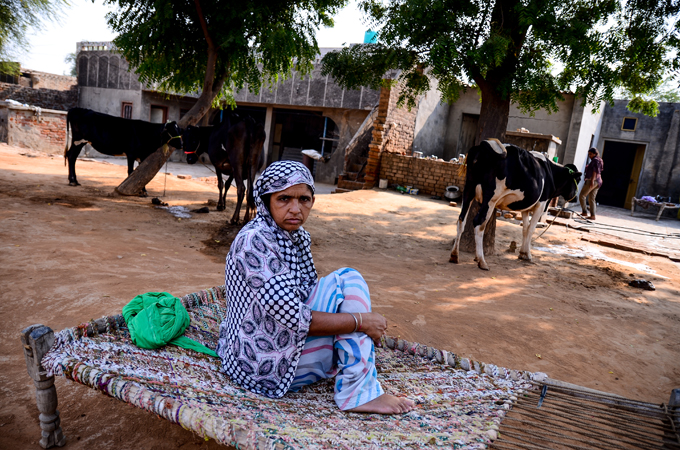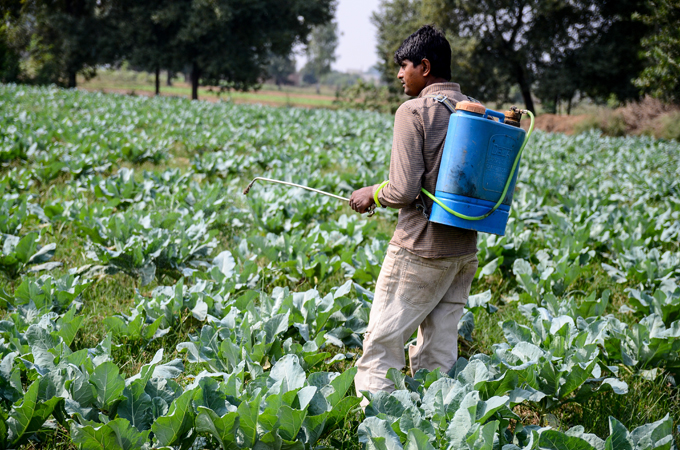On the ‘Cancer Train’ of India’s pesticides
Rural cancer patients cram train for city medical treatment of illnesses many link to the use of pesticides in farming.

Bathinda, India – As the digital clock beamed 21:00, the shabby and dimly lit Bathinda train station came to life as frail patients swarmed the platform and jostled for seats on the “Cancer Train”.
Ramkishan, a man of about 50 breathing heavily and coughing, remained seated until the rush died down, then trudged to the train and secured his reserved window seat.
Keep reading
list of 4 itemsWoman, seeking loan, wheels corpse into Brazilian bank
UK set to ban tobacco sales for a ‘smoke-free’ generation. Will it work?
Poland lawmakers take steps towards liberalising abortion laws
“I am going to Bikaner hospital,” he told Al Jazeera breathlessly. “I have been told I am in the final stages of cancer. I know this could be my final journey, too.”
The 12-coach train has gained its name from a sudden surge in cancer cases in India’s northwest Punjab state that many blame on growing pollution and pesticide use – and an ineffective response by authorities.
Poor patients from across Punjab flock to catch the 9:30pm train to head to the desert city of Bikaner for specialist treatment, arriving early morning after a seven-hour journey. On this occasion, the train’s sole reserved compartment, with a capacity of 72, is occupied by 30 cancer patients.
“Earlier, this train used to be known as the ‘TB Train’ [as tuberculosis patients used to frequent faraway hospitals], but over the past few years it has come to be known as the ‘Cancer Express’,” said DP Kataria, a conductor on the train for 25 years.
Its ticket collector, who asked not to be named because he was not authorised to speak to the media, agreed.
People have no option but to drink highly polluted water and bathe in tap water that is sourced from canals where industrial effluents are discharged with near impunity.
“This train is meant for cancer patients, on average 60 percent of seats are occupied by the Bikaner-bound patients. Many more patients travel in crammed general compartments as they cannot afford to pay for reservations,” he said.
Simarpal Kaur, 50, a schoolteacher onboard the train, blamed the rise in cancer cases on polluted drinking water and pesticides that poison food grains, fruits and vegetables.
Surge in cancer cases
Mindful of the issue, the Punjab state government has set up water purifiers in hamlets most affected by the disease such as Bhuttiwala – dubbed a “cancer village” – but those are not cleaned properly, residents say.
“There has been no comprehensive survey on the prevalence of cancer in Punjab, so there is no concrete data on it,” said Dr Pritpal Singh of the Baba Farid Centre for Special Children.
“People don’t disclose someone in their houses has cancer fearing stigmatisation. So most cases come to the fore when the patient reaches the last stage of cancer.”
Eight months ago, the Baba Farid Centre conducted a survey in Bhuttiwala village that identified 20 cancer patients, but when Al Jazeera travelled there to meet them, 18 had already died.
A Greenpeace report conducted by scientists from Exeter University in the United Kingdom found 20 percent of wells sampled have nitrate levels above World Health Organisation safety limits of 50mg per litre for drinking water. Nitrate pollution can have a serious impact on health, especially among children.
 |
| This woman in Butiwala village suffers from breast cancer [Sujanya Das/Al Jazeera] |
In 2010, Baba Farid Centre teamed up with Micro Trace Minerals Laboratory in Germany on a study that found “disturbingly high” levels of heavy metals such as barium, cadmium, manganese, lead and uranium in local children aged between 13 and 18.
Although the report caused an uproar and prompted authorities to act, the steps taken have had little impact, according to Dr Singh.
He said he deals with 30 new cases of children suffering from congenital deformity, autism and mental retardation every day.
“In a damage-control move, the Punjab government did set up water purification units, but that was merely tokenism because much of the equipment is still dysfunctional,” said Singh.
“So people have no option but to drink highly polluted water and bathe in tap water that is sourced from canals where industrial effluents are discharged with near impunity.
“Besides, intensive use of pesticides in farming and excessive exploitation of groundwater for irrigation has polluted the groundwater. It is a vicious circle of soil, water and food-chain pollution in Punjab.”
‘Green revolution’
Singh blamed the so-called “green revolution” for polluting the soil, water and air “beyond repair”. This was a period during the 1960s of rapid agricultural development – earning Punjab the “bread basket of India” moniker – based on intensive farming that made extensive use of chemicals.
“The rampant and mindless use of pesticides to give impetus to the green revolution is responsible for this harrowing situation in Punjab,” Singh said.
But writer and social activist Avtar Gondare said the agricultural revolution was needed to feed India’s population of more than one billion people.
“Nobody can deny that green revolution has helped raise the living standard of people in Punjab. Go anywhere in Punjab, you will hardly see any huts. Here even farmers live in kothis, drive cars and wear branded clothes. Green revolution was the need of the hour. Had it not happened, we would not have been able feed our ever-increasing population.”
Critics say officials are still ignoring the problem. Although pesticides such as endosulfan and DDT are banned globally they can still be bought easily.
Punjab’s government commissioned its own cancer survey in 2010 in Punjab that identified 130 cancer patients per 100,000 people – in line with the national average of 137.
 |
|
A farmer sprays pesticide in Faridkot, Punjab [Sujanya Das] |
Singh was highly critical of the methodology used, however, calling it a “mockery” of cancer surveys.
Growing concern
Dr Karnjit Singh, Punjab’s director of health, insisted that multiple factors were responsible for the spike in cancer cases within the state.
“There are several factors such as Hepatitis B, virus infection and smoking,” he told Al Jazeera. “It would be wrong to say pesticide poisoning is causing cancer in the state.”
India’s federal government has expressed concern about pesticide poisoning and plans to amend legislation on fertilisers and pesticides, although it is likely to encounter opposition from the powerful fertiliser and pesticide lobby.
But the government has denied pressure from lobby groups. “If there is any lobby, it is a lobby for the farmers,” said Minister of State for Agriculture Sanjeev Kumar Baliyan.
India has agreed to phase out the use of endosulfan by 2017 and all existing stock of pesticides in the country past its expiry date.
Baliyan admitted the government cannot issue a blanket ban on the use of pesticides, but he said it was looking at alternatives, such as organic farming.
“Pesticides have played a role in protecting crops from pests, but they also had toxic properties, that’s why there is a need to regulate them. We are doing everything possible to promote organic farming,” said Baliyan.